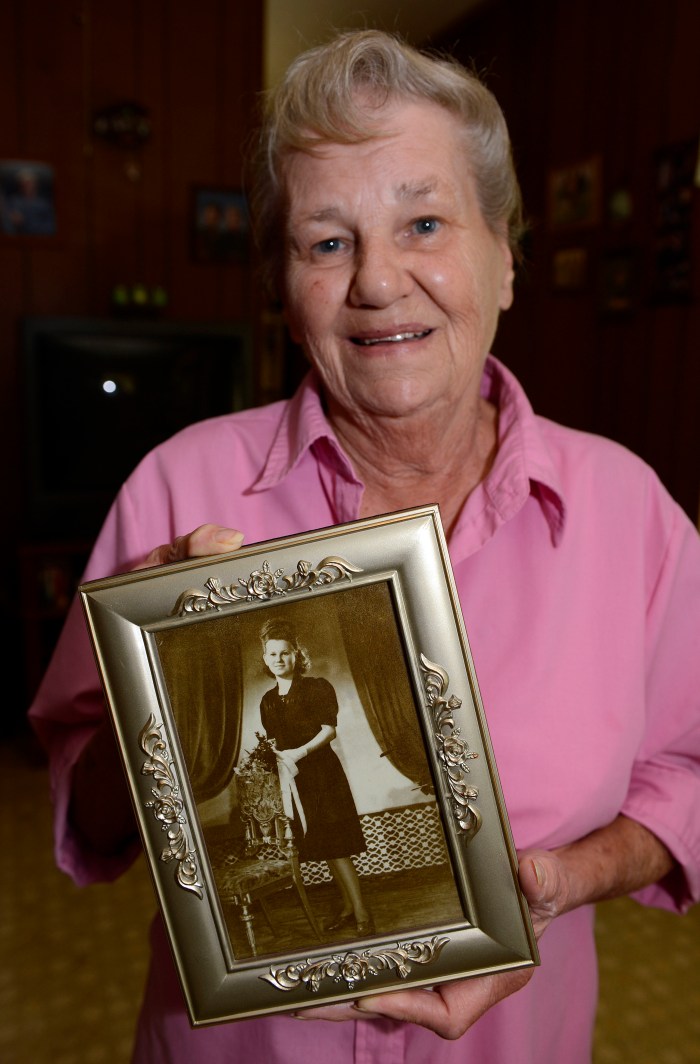
By George Morris
Most Americans remember World War II through the eyes of veterans who fought, families who awaited their return, or from movies produced from the victors’ point of view.
Eva Rieseler Bardsley had a different vantage point.
Bardsley grew up in Berlin and was 12 years old when Germany’s surrender in 1945 ended the war in Europe. She saw her city turned to rubble, was bombed out of her home three times and separated from her family for more than a year. She struggled to avoid starvation and rape in the chaos of war’s end.
“I should have folded up,” said Bardsley, a longtime Watson, Louisiana, resident. “But I really had a good outlook on life, and even those times as a little girl, I always hoped and prayed there was a better time coming.”
Times were certainly better before war began in 1939, although her parents did not care for the nation’s leader, Adolf Hitler. But they were smart enough to keep quiet.
“You couldn’t trust nobody,” she said. “You couldn’t give no opinions of Hitler, or the next day somebody knocked on the door and you was picked up. You was never seen again.”
Early in the war, British attempts to bomb Berlin were sporadic. But it intensified, with the British bombing at night, the Americans by day.
When the air raid sirens sounded, her family went to their apartment building’s cellar and awaited their fate.
“You walked to school. You’d already been through an air raid that night, and you were lucky you were alive,” she said. “All you could think of is you were hoping and praying there wouldn’t be an air raid while you were in school.
“Then, if you did have an air raid, and most of the time we did, all you could think of after school was you didn’t know if you had a home to go home to, whether your mother and daddy and brothers and sisters were still there. … Some people didn’t choose to go to the cellars when the sirens sounded off. They decided to stay in their little apartment. Of course, you found them dead inside. A body here, an arm there.”
In one instance rescuers had to dig through rubble that covered the only way out of the cellar. Her youngest brother became so paralyzed with fear that the family had to help dress him, and he had nightmares after the war.
To protect her, Eva’s family sent her to Posen, Poland to stay with friends, but the safe haven didn’t last long. As the Soviet army attacked from the east, German civilians fled back toward home.
The Soviets overtook them in eastern Germany before they could reach Berlin, beginning a horrifying occupation.
“The Russians was like animals,” Bardsley said. “Not only myself but a lot of other girls, there was many times we had to head for the hayloft and stay in the barn for a week or two with the hay because they was raping everything under the sun — old women, young women, children. I was counting my blessings, just very fortunate.”
Civilians scrounged to survive. They robbed trains that had been destroyed while bringing supplies to the front to get food. Sometimes, they would go as long as four days between meals, so they rationed food whenever they could obtain it. There was hardly any coal to provide heat in the winter.
“When you’re cold and hungry, I don’t know how much sicker you can get,” she said. “We can forget a lot of pains that we may have in our lives, but the hunger pains are something different.”
Late in the war, Bardsley’s father was drafted into the army and captured by the Soviets, and her mother was bombed out again, so they lost contact. Her older sister had been drafted into the air force and was never heard from again.
Required by the Soviet occupiers to stay in East Germany until she turned 18, her landlords helped sneak the 13-year-old Bardsley back to Berlin in 1946, where she reunited with her mother and, eventually, her father, who had suffered in two years of captivity.
“When he came out, it was like a piece of furniture walking around,” she said. “Something happened to him. Nobody knows. He wouldn’t talk about it. Some people can’t talk about it.”
She remained in West Berlin until 1954, then immigrated to Canada, where she married an American, Richard Bardsley, and settled in Philadelphia. They moved to Baton Rouge in 1956, divorced, and she settled in Watson, raising four boys and a girl by doing custodial work for Livingston Parish schools and other jobs to make ends meet.
When administrators learned of her story, they often insisted that she speak to students. She hopes her experiences gave them some perspective.
“I know a lot of people don’t believe this, but still America is a wonderful country,” she said. “We’re still, in a way, free. We can call the president anything we want and there is nobody that’s going to knock on that door and haul you off. We still have our freedom of speech. We still are free to go to any church we want. American people today, I think, gripe too much. Be happy with what you’ve got.”
I like reading these stories. In resent years I have tried to look at this war from both sides. Not all Germans where supporters of Hitler. And being of German desent this makes me smile.
LikeLike
This is an article on my mother. She has since passed but it is wonderful to see her story still living on. Thank you for continuing this on.
LikeLike
Ms. Eva was one of the most beautiful, precious people I’ve known. My children and I loved her beyond words. Her spirit, laughter, and love will live in our hearts forever.
LikeLike